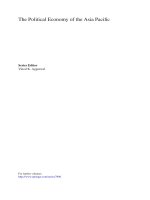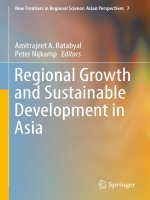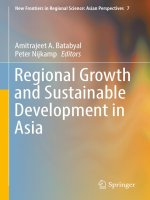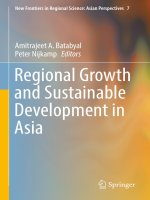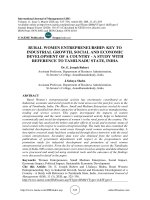Economic growth and economic development 192
Bạn đang xem bản rút gọn của tài liệu. Xem và tải ngay bản đầy đủ của tài liệu tại đây (93.26 KB, 1 trang )
Introduction to Modern Economic Growth
4.4. The Effect of Institutions on Economic Growth
We now argue that there is convincing empirical support for the hypothesis that
differences in economic institutions, rather than luck, geography or culture, cause
differences in incomes per-capita. Let us start by looking at the simplest correlation
between a measure of economic institutions and income per capita.
.
10
L o g G D P p e r c a p ita , P P P , in 1 9 9 5
LUX
USA
CHE
JPN
NOR
DNK
BEL
CAN
AUT
FRA
ISL NLD
AUSITA
GBR
SWE FIN
IRL
NZL
ESP
PRT
SGP
HKG
ARE
KWT
ISR
QAT BHR
MLT
PAN
IRN
PER
GTM
SUR
8
UGA
BFA
MDG
ROM
JAM
JORPRY
MAR
EGY
CZE
HUN
RUS
BGR
IDN
CHN
LKA
ZWE
CMR
GIN
SEN
PAK GHA
VNM
COG
HTI
ZAR
TUN
ECU
DZA
PHL
SYR
BOL GUY
SLV
AGO
HND
NIC
SDN
DOM
KOR
GRC
CHL
BHS
SAU
OMN
VEN
URY
MEX GAB
ZAF
BWA MYS
CRI COL
TTOTHA BRA
TUR POL
ARG
CIV
TGO
MNG
IND
GMB
KEN
BGD
NER
NGA
MLI
SLE
ETH
ZMB
YEM
MOZ MWI
TZA
6
4
6
8
Avg. Protection Against Risk of Expropriation, 1985-95
Figure 4.1. Relationship between economic institutions, as measured by average expropriation risk 1985-1995, and GDP per capita.
Figure 4.1 shows the cross-country correlation between the log of GDP per-capita
in 1995 and a broad measure of property rights, “protection against expropriation
risk”, averaged over the period 1985 to 1995. The data on this measure of economic
institutions come from Political Risk Services, a private company which assesses the
risk that foreign investments will be expropriated in different countries. These data
are not perfect. They reflect the subjective assessment of some analysts about how
secure property rights are. Nevertheless, they are useful for our purposes. First, they
emphasize the security of property rights, which is an essential aspect of economic
institutions, especially in regards to their effect on economic incentives. Second,
178
10



